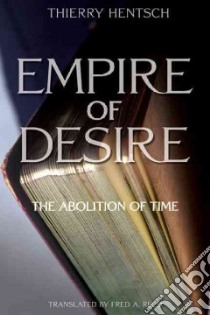Empire of Desire - 9780889225879
Un libro in lingua di Thierry Hentsch edito da Northwestern Univ Pr, 2009
- € 21.40
- Il prezzo è variabile in funzione del cambio della valuta d’origine
Empire of Desire, the second volume of Hentsch's epic survey of the formative texts of the Western narrative tradition, completes the work he began in the first: Truth or Death. It traces Western civilization's quest for immortality across a further four centuries--from Moliere to Proust, by way of Voltaire and Rousseau, Goethe and Hegel, Melville and Joyce--ending in 1922, coincidentally the year Ulysses was published and Marcel Proust breathed his last.
Truth or Death had revealed how the Biblical imperative of salvation gradually and systematically transferred the quest for immortality from the religious to the profane, as technoscience came to supplant God in the "age of reason."
Now, in Empire of Desire, Thierry Hentsch presents "modern man"--freed from the imperative of transcendence--as a creature who "desires to desire, moving without cease from one object to another, in a state of self-imposed oblivion," the Western narrative tradition reaching its apotheosis with the work of Marcel Proust, in whose exquisitely crafted prose, desire has become the artist's instrument of choice--the vivisectionist's scalpel.
Hentsch's untimely death in 2005 has left us, as his generous bequest, a vivid, multi-faceted literary testament. Proust, foreshadowing the title of the mortal bargain, Raconter et Mourir--to tell the tale, and to die--brings Hentsch's reading of the Western literary tradition full circle. Proust, "in whose company despair can find no finger-hold, in whose company I learn with every passing day that literature is nothing more than life reflected upon, recaptured; that it is the expression--an expression that takes one's breath away--of those simple instants that poets have sought after since time out of mind, and whose fleeting yet powerful pleasure give us, for a spark of eternity, the feeling that we ourselves partake of the abolition of time."
Informazioni bibliografiche
- Titolo del Libro in lingua: Empire of Desire
- Sottotitolo: The Abolition of Time
- Lingua: English
- Autore: Thierry Hentsch
- Editore: Northwestern Univ Pr
- Collana: Northwestern Univ Pr (Paperback)
- Data di Pubblicazione: 28 Febbraio '09
- Genere: LITERARY CRITICISM
- Argomenti : Narration (Rhetoric Literature History and criticism Time in literature
- Dimensioni mm: 222 x 152 x 19
- ISBN-10: 0889225877
- EAN-13: 9780889225879


